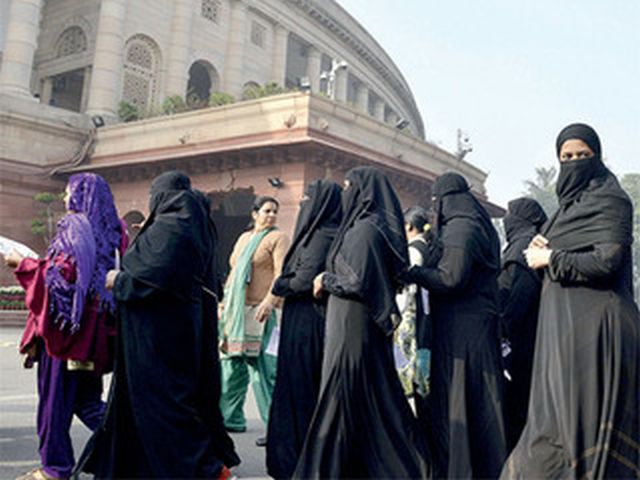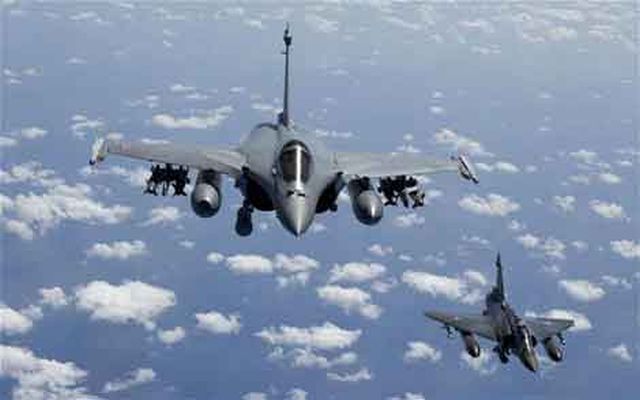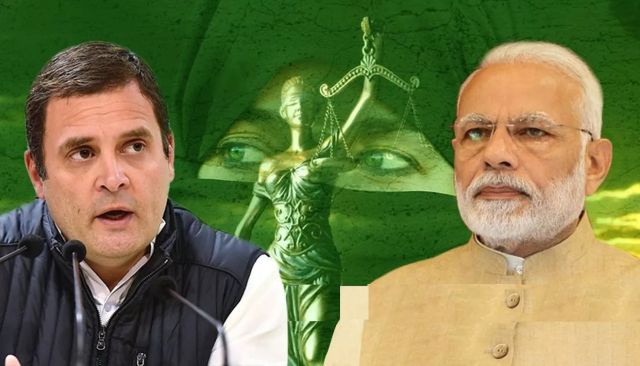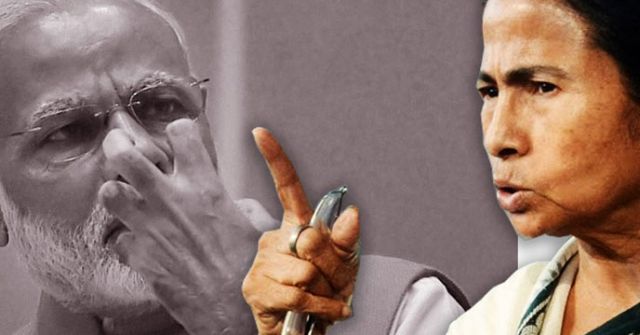
by admin | May 25, 2021 | News, Politics
 New Delhi : The revised triple talaq bill, which the government is keen on pushing through Parliament, could not be taken up in the Rajya Sabha on Monday as the opposition insisted on sending it to a select committee. The treasury benches said the passage of the bill is being delayed deliberately.
New Delhi : The revised triple talaq bill, which the government is keen on pushing through Parliament, could not be taken up in the Rajya Sabha on Monday as the opposition insisted on sending it to a select committee. The treasury benches said the passage of the bill is being delayed deliberately.
The stalemate saw heated arguments between the opposition and the government, forcing Deputy Chairman Harivansh Narayan Singh to adjourn the house for the day. Both sides accused the other of “doing politics”.
When the House met for the post-lunch sitting following an earlier adjournment, the Deputy Chairman said that the House will be taking up the triple talaq bill, passed by the Lok Sabha last week. However, opposition members were on their feet demanding that the bill be sent to the select committee.
Leader of Opposition Ghulam Nabi Azad said the government has been disregarding since 1993 the practice of sending important bills to the standing committee for legislative scrutiny.
“Since the government does not send such bills to the standing committee, the opposition in the Rajya Sabha is forced to fight for sending them to select committee,” he said.
Azad said the bill would affect crores of people in a positive or negative way and its scrutiny by parliament was essential. He said the opposition parties want to move a resolution that the bill should be sent to select committee.
Referring to the protest in the House by AIADMK members over a proposed dam on Cauvery river, he said 90 per cent of the opposition parties want the House to function.
Trinamool Congress member Derek O’Brien said most opposition parties are united in their demand for select committee and are willing to debate and pass it after due parliamentary scrutiny. He said he had given notice for sending the bill to select committee.
Minister of State for Parliamentary Affairs Vijay Goel said that the opposition is delaying the passage of the bill by demanding scrutiny by select committee.
“A message should go to the country that the opposition is creating road blocks to the passage of the bill. They are not in favour of Muslims. They are not in favour of giving women their rights. They are doing politics,” he said.
“We are ready to debate it. The debate should begin now,” he added.
As the stalemate persisted, the Deputy Chairman adjourned the House for 15 minutes. When the House reassembled, opposition members were again on their feet, persisting with their demand.
Congress leader Anand Sharma said the minister has cast aspersions on the opposition and made false allegations.
He said the opposition is not opposed to the bill. “The government is doing politics. Without legislative scrutiny, the bill cannot be passed,” he said.
Law Minister Ravi Shankar Prasad said the issue concerns humanity.
“Triple talaq is taking place despite Supreme Court outlawing it. The bill should not be delayed. The government is willing to consider suggestions of the opposition,” he said.
Harivansh had earlier expressed his anguish over repeated adjournments of the House, saying the entire country is watching.
He said people are seeing that Lok Sabha is conducting its business but the upper house is not functioning.
—IANS

by admin | May 25, 2021 | News, Politics
 By Brajendra Nath Singh,
By Brajendra Nath Singh,
New Delhi : Prime Minister Narendra Modi and the ruling BJP face a tough challenge in the Lok Sabha elections in the coming summer in the wake of its defeat in the recent Assembly elections in Madhya Pradesh, Rajasthan and Chhattisgarh and mounting worries on the economic front.
Even at the end of 2017, no one would have given the opposition a chance in the next general elections after BJP’s sweeping success in Uttar Pradesh Assembly elections in the wake of demonetisation and surgical strikes on terror hideouts across the Line of Control in Jammu and Kashmir and its ability to come to power in other states where it was not the largest party.
However, the BJP was contained in Modi’s home state of Gujarat in the year-end Assembly elections where it was stopped short of the 100 mark, signalling the green shoots of recovery for the Congress.
The change in the last one year became evident after a united Samajwadi Party and Bahujan Samajwadi Party defeated the BJP in the Lok Sabha by-elections in its strong holds like Gorakhpur and Phulpur and along with the RLD, in Kairana in Uttar Pradesh. The Congress worsted the BJP in parliamentary by-elections in Madhya Pradesh, Maharashtra and in Karnataka.
Also, the Congress was quick to learn from BJP’s game elsewhere and surrendered the Chief Minister’s post to the JD-S in a post-poll tie up to keep the BJP out of power in Karnataka, despite the saffron party emerging the single largest in the summer of this year.
The results of the recent Assembly polls in five states, where the Congress snatched power from the BJP in the Hindi heartland, has given a major boost to the opposition parties and could be a factor in the battle for control of the next Lok Sabha.
During the year, the BJP had lost seven out of the 13 by-elections in parliamentary constituencies. Of these, it held nine since 2014. It could retain only Palghar in Maharashtra and Shimoga in Karnataka.
Since 2014, the BJP managed to retain just six Lok Sabha seats in by-polls. Besides Palghar and Shimoga, it had won Lakhimpur in Assam, Shahdol in Madhya Pradesh, Beed in Maharashtra and Vadodara in Gujarat.
In the last four-and-half-years, the party has lost Lok Sabha by polls in Ratlam in Madhya Pradesh, Gurdaspur in Punjab, Alwar and Ajmer in Rajasthan, Kairana, Phulpur and Gorakhpur in Uttar Pradesh, Bhandara-Gondiya in Maharashtra and Bellary and Mandya constituencies in Karnataka. The BJP’s tally in the Lok Sabha has come down to 268 from 282 in 2014.
The results of the recent Assembly polls and the by-elections may have signalled the weakening of the “Modi wave” of 2014 the road ahead may not be easy for the saffron party, given the fact that major parties like SP and BSP in Uttar Pradesh are planning an anti-BJP alliance and formation of the RJD-led alliance in Bihar, the two states which send 120 of the 543 elected MPs to the 545-member Lok Sabha, where two members are nominated.
Although the BJP-led government has been counting various of its schemes including Mudra, Ujwala, Saubhagya, opening of ‘jan dhan’ bank accounts, One Rank One Pension, and decisions on demonetisation, GST and the surgical strikes across the border in Pakistan as its major achievements in last four-and-a-half-years, the issues related to farmers and impacts of demonetisation and GST, NPAs crisis have come as a major dampener for the ruling party.
Unlike in 2014, when they were the challenger at the Centre and in many states, when an untested Modi made various promises, he and his party would now face a lot of questions to answer on the “achhe din” they had offered to the electorate.
During the last election campaign, Modi had promised one crore jobs a year and depositing of Rs 15 lakh in each persons account from the black money to be repatriated from abroad. The opposition is likely to rake up the issues and demand answers over the crisis of unemployment and agrarian distress among others.
Besides, the party is also facing the heat from the VHP and RSS, which have been mounting pressure on the government for constructing a Ram temple at Ayodhya by bringing a law or ordinance. Opposition parties allege that the sangh parivar, headed by RSS, may like to raise the political temperature on their pet issues to polarise the political situation.
Although the Supreme Court has given a clean chit to the government on the Rafale fighter jet deal, the issue remains live as the Congress has been pushing for a Joint Parliamentary Committee (JPC) probe.
In the Hindi hearltland of Bihar, where the BJP had won 22 of the 40 seats in 2014, Chhattisgarh (10 out of 11), Haryana (10-10), Himachal Pradesh (04-04), Jharkhand (12-14), Madhya Pradesh (16-29), Rajasthan (25-25), Uttarakhand (05-05), Uttar Pradesh (71-80) and Delhi (07-07), 182 out of 225 seats came into the party’s kitty in 2014.
In the present political scenario, political analysts feel the BJP is unlikely to repeat its performance of 2014, especially in key states like Uttar Pradesh as the coming together of the Samajwadi Party and Bahujan Samaj Party in Uttar Pradesh, social equations are likely to change.
In Bihar, the ‘mahagathbandhan’ of Rashtriya Janata Dal, Congress, Hindustani Awam Morcha and Rashtriya Lok Samata Dal has already been formed. Though the Janata Dal-United has now allied with the BJP and the LJP, the grand alliance remains focussed on social engineering of Maha Dalits, extremely backward communities, along with RJD’s traditional Muslim-Yadav votebank.
In Madhya Pradesh, Rajasthan and Chhattisgarh the BJP has already lost power to Congress and the BJP’s numbers are likley to drop in 2019.
In Maharashtra, the BJP ally, the Shiv Sena, may cause anxiety as both the parties don’t sharing good vibes. Maharashtra is the largest state after Uttar Pradesh as it sends 48 MPs to Lok Sabha. In the last election, the BJP won 23 seats and the Shiv Sena won 18.
In Gujarat, which is considered the BJP’s bastion and the Hindutva laboratory, the state to which Modi and BJP President Amit Shah belong, it may not be easy to repeat the 2014 performance given the Congress’ fightback in last year’s Assembly polls.
Andhra Pradesh has 25 seats in the Lok Sabha. Earlier, the BJP and Telugu Desam Party (TDP) fought together, with the BJP winning two seats and the TDP 15. Now, the TDP is out of its fold, the BJP is trying to woo a new ally in the form of YRS Congress – at least post poll.
In Tamil Nadu, where it is facing heavy headwinds, the party is trying to woo the ruling AIADMK, which is itself split, to take on a formidable DMK-Congress combine in which a number of other regional parties will also find a place. The state has a tradition of voting one way and the results in 40 seats including one in Puducherry will be crucial to the national outcome.
(Brajendra Nath Singh can be contacted at brajendra.n@ians.in)
—IANS

by admin | May 25, 2021 | News, Politics
 New Delhi : Union Home Minister Rajnath Singh on Monday rejected allegation of corruption in the Rafale fighter jet deal while asserting that a lie repeated again and again cannot become truth.
New Delhi : Union Home Minister Rajnath Singh on Monday rejected allegation of corruption in the Rafale fighter jet deal while asserting that a lie repeated again and again cannot become truth.
“The Congress should understand that a lie spoken many a times a cannot turn into truth. We have been ready for a discussion from the very first day. But why is the opposition party running away (from a discussion),” Singh said in the Lok Sabha.
He was responding to Congress leader Mallikarjun Kharge’s accusations on the issue during Zero Hour amid protests and slogan shouting by opposition members including those of Congress, AIADMK and the TDP on different issues.
Raising the issue, Kharge reiterated his party’s demand for a Joint Parliamentary Committee (JPC) probe into the deal alleging that it was one of the biggest “scams” of the country.
“We are demanding a JPC probe for three weeks. Allow it,” he said, questioning the government for not disclosing the price of the aircraft.
He claimed that the Rafale fighter jets have been purchased at a price three times higher than the UPA government’s deal.
“Why the government is not disclosing the prices even as the French President has said it can be disclosed,” he said.
Not satisfied with the government’s response, the Congress members continued with their protest.
Earlier, the Lok Sabha witnessed a brief adjournment during question hour. Congress members trooped near the Speaker’s podium demanding a JPC probe into the Rafale deal.
AIADMK members were protesting against the proposed construction of a dam across river Cauvery. TDP members sought special status for Andhra Pradesh.
—IANS

by admin | May 25, 2021 | Opinions

Representational Image (google image)
By Amulya Ganguli,
The day before the Bharatiya Janata Party (BJP) waxed eloquent on the triple talaq bill in parliament, saffron bullies confronted a group of Muslims offering namaz (prayers) at a park in Noida, UP.
The attitude of the storm-troopers was both mocking and threatening. Today you are offering namaz, tomorrow you will build a mosque here, they said jeeringly to the obviously intimidated Muslims.
The BJP’s television warriors supported the saffronites during a debate on the subject, arguing that permission has to be taken before “occupying” a public place.
Where the BJP and the Sangh parivar are concerned, there is no question of showering petals from helicopters on the namazis as was done in UP on the kanwariyas or the worshippers of Lord Shiva as they marched along the roads and highways with or without formal permission.
These contrasting attitudes of the party in power at the centre towards Hindu and Muslim devotees – lenience towards the former and sternness towards the Muslims – do not conform to the BJP’s outpouring of concern for the Muslim women who may be victims of the admittedly ludicrous and abhorrent practice of Muslim men summarily divorcing their wives on flimsy grounds.
If the BJP is genuinely concerned about the welfare of Muslim women, its feelings of benevolence and sympathy should be reflected in its attitude towards the entire community and not only towards a particular section.
Since this isn’t the case as the vituperation directed at Muslims by the trolls shows, along with the advice of saffron stalwarts like Vinay Katiyar who want the Muslims to leave India for Pakistan or Bangladesh, or the urging of a BJP MP to dig up the Jama Masjid to uncover the hidden temples, the suspicion wiill be that the BJP’s focus on the triple talaq issue is guided more by political than humane, gender-based considerations.
The party’s calculation apparently is that since the Muslims as a whole are unlikely to vote for it in view of the parivar’s nine-decade-long preference for a Hindu rashtra, it can be politically useful to wean away at least some of the women.
Another objective of the party is to offer a Hobson’s choice to its opponents where opposing the bill will depict them as anti-women while supporting it will mean meekly endorsing their adversary, the BJP’s stance, much to its delight.
For the present, sections of the opposition evaded the trap by walking out of the Lok Sabha before the voting took place. But the issue will come up again in the Rajya Sabha where a clear-cut stance will have to be taken.
As of now, the opposition wants the bill to be sent to a joint select committee since some of the provisions need to be modified, especially the one relating to criminalising the “offence” of divorcing the wife.
Undoubtedly, this is the sticking point, for it is absurd to criminally prosecute a man for a divorce even if his act is whimsical and has no sanction even in other Muslim countries. For such a practice to be prevalent only in India brings no glory to the Muslims.
Ideally, the “reform” in this respect should have come from within the community. However, since the organisations which claim to look after the Muslim interests in India had taken no interest in the matter all these years, it had to be left to the Supreme Court to ban the practice of triple talaq although it did not call for a law.
If the BJP has favoured the legal process, it is for two reasons – both political. One is to look for votes by championing the cause of women’s empowerment, and the other is to send a message to the Muslims (and other minorities) that the present government will not hesitate – unlike its “secular” predecessors – to legislate in matters which fall within the purview of their personal laws even if the triple talaq issue is little short of an outrage which should have been ended long ago.
If the “secular” governments had been hesitant in this regard, the reason undoubtedly was that they were unwilling to interfere in the affairs of a community which suffered from a guilt complex for having caused the country’s partition – a “sin” for which they were accused of being unpatriotic, especially by the Hindu Right.
However, now that a Hindu nationalist government has done what the Left-Liberals were reluctant to do, the latter can rectify some of their earlier lapses such as overturning the Supreme Court judgment in the Shah Bano case on maintenance for divorced women and help in fine-tuning the triple talaq legislation in a manner which will make it acceptable to the political class as a whole.
The BJP’s defeats in the Karnataka, Rajasthan, Madhya Pradesh and Chhattisgarh elections have shown that the triple talaq issue hasn’t been of much help to the party. If it has now rushed through the bill in the Lok Sabha, it is perhaps with the general election in mind.
However, the endeavour of all parties should be to keep the matter as far above politics as possible and ensure that the new law does not penalise either men or the women or the children of divorced parents.
(Amulya Ganguli is a political analyst. He can be reached at amulyaganguli@gmail.com)
—IANS

by admin | May 25, 2021 | Employment, News, Politics
 Kolkata : West Bengal Chief Minister Mamata Banerjee on Friday accused the BJP-led Central government of deliberately not releasing funds for various Central schemes and said Rs 2,500 crore under the Mahatma Gandhi National Rural Employment Guarantee Act (MNREGA) scheme was due to the state.
Kolkata : West Bengal Chief Minister Mamata Banerjee on Friday accused the BJP-led Central government of deliberately not releasing funds for various Central schemes and said Rs 2,500 crore under the Mahatma Gandhi National Rural Employment Guarantee Act (MNREGA) scheme was due to the state.
Accusing the Centre of a “step-motherly attitude” towards the state, Banerjee claimed that people of rural Bengal are not able to withdraw money under the scheme due to lack of bank branches in certain places.
“Some people did not get the money under the MNREGA scheme because the Centre has not provided the money. It is not their money, it is the money of the common people.
“Around 2,500 crore is due in the state under the MNREGA scheme. We have decided to provide the money from the state fund to save people from their agony,” Banerjee said at an event in South 24 Parganas district’s Sundarban area.
“There are many places in Bengal where people are not getting the money of MNREGA because there are no banks even today after so many years of independence,” she alleged.
Pointing out that both the state and Central governments are elected through a democratic process, the Trinamool Congress supremo said it is the duty of the Centre to help out the states, not to stop their funds or stoke unrest.
Referring to the Gangasagar Mela in West Bengal, a famous Hindu festival where thousands of devotees gather to take a holy dip in the confluence of the Ganges, the Chief Minister said the Centre neither provides any funds nor takes any initiative to improve the facilities there.
“The Centre provides huge funds to the Kumbh Mela but they do not care about the Gangasagar Mela. We do not need their money. Go and see the development done by the state government in that region. All the facilities are now available,” she claimed.
—IANS

 New Delhi : The revised triple talaq bill, which the government is keen on pushing through Parliament, could not be taken up in the Rajya Sabha on Monday as the opposition insisted on sending it to a select committee. The treasury benches said the passage of the bill is being delayed deliberately.
New Delhi : The revised triple talaq bill, which the government is keen on pushing through Parliament, could not be taken up in the Rajya Sabha on Monday as the opposition insisted on sending it to a select committee. The treasury benches said the passage of the bill is being delayed deliberately.



